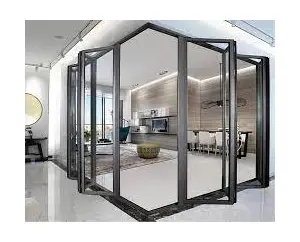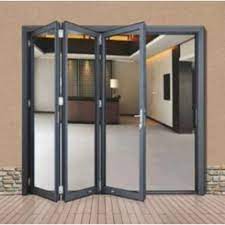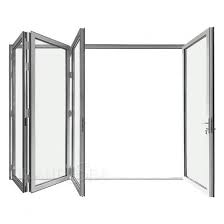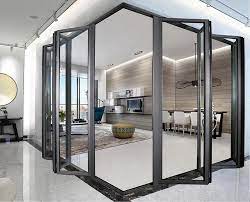The Versatility and Elegance of Folding Doors
A folding door is a versatile architectural element that saves space by folding in on itself when opened. It is composed of multiple panels connected by hinges, allowing for seamless transitions between indoor and outdoor spaces. Folding doors come in various materials and styles, enhancing both functionality and aesthetic appeal in residential and commercial settings. Regular maintenance, including cleaning and lubrication, ensures their smooth operation and longevity.
Benefits of Folding Doors: Creating Space and Style

Folding doors, with their ingenious design and space-saving capabilities, have revolutionized the way we interact with our living spaces. These versatile architectural elements seamlessly blend form and function, offering a transformative solution for both residential and commercial environments. With a rich history dating back centuries and a wide array of contemporary applications, folding doors have become a cornerstone of modern interior design.
The Evolution of Folding Doors
The concept of folding doors has a storied history that spans across centuries and civilizations. Their evolution is a testament to the ingenuity of human design and the enduring need for flexible living spaces.
Folding doors trace their origins back to ancient cultures, where they were ingeniously crafted to serve both functional and aesthetic purposes. Among these early innovators were the Romans, who utilized wooden panels on hinges to divide rooms and create privacy within their homes. Similarly, the Chinese ingeniously incorporated folding doors in their architecture, using intricate lattice patterns and wooden panels to craft partitions that could be effortlessly folded aside.
As time progressed, so did the sophistication of folding door design. During the Renaissance period, European craftsmen elevated the art of woodworking, creating ornate and beautifully carved folding doors that adorned the interiors of grand estates and palaces. These doors not only served as functional room dividers but also became significant artistic and architectural statements.
The Industrial Revolution brought about a shift in manufacturing capabilities, allowing for the mass production of folding doors. This accessibility led to their widespread adoption in homes and commercial spaces, becoming a hallmark of versatile interior design.
In the modern era, technological advancements and innovative materials have propelled folding door design to new heights. Contemporary folding doors now incorporate a range of materials, from sleek aluminum frames to expansive glass panels, offering a seamless integration of indoor and outdoor spaces.
Types of Folding Doors
Folding doors come in a variety of styles, each tailored to specific architectural and functional needs.
- Bi-Fold Doors:
- Description: Bi-fold doors are perhaps the most popular and recognizable type. They consist of two or more panels that are hinged together. When opened, these panels fold in on themselves, creating a wide opening.
- Function: Bi-fold doors are commonly used to connect indoor and outdoor spaces, such as patios, gardens, or balconies. They are also employed as room dividers, allowing for flexible use of interior spaces.
- Accordion Doors:
- Description: Accordion doors operate on a track system that allows them to fold and stack neatly to one side. They are typically made up of multiple panels connected by hinges.
- Function: Accordion doors are ideal for spaces where a wide opening is required, but there may be limited wall space for the doors to slide open. They are commonly used in areas like conference rooms, banquet halls, and large living spaces.
- Pocket Doors:
- Description: Pocket doors are single panels that slide into a recessed pocket in the wall when opened. Unlike true folding doors, they do not fold; however, they serve a similar space-saving purpose.
- Function: Pocket doors are a fantastic solution when space is limited for a swinging door. They are commonly used in small bathrooms, closets, and tight hallways.
- Sliding and Stacking Doors:
- Description: Sliding and stacking doors consist of multiple panels that slide and stack against one another. They can be designed to stack either to the left or right, or even slide into a hidden pocket.
- Function: These doors are versatile and can be used to create expansive openings, effectively blurring the lines between indoor and outdoor spaces. They are frequently used in homes with large terraces or patios.

Materials and Finishes: Balancing Aesthetics and Functionality
The choice of materials and finishes for folding doors is a critical aspect of their design, impacting both their aesthetic appeal and functionality.
- Wood:
- Description: Wooden folding doors exude natural warmth and timeless elegance. They can be crafted from a variety of wood species, each with its unique grain pattern and coloration.
- Advantages:
- Aesthetic Appeal: Wood adds a touch of sophistication and organic beauty to any space.
- Customization: It can be stained or painted to match existing decor or create a specific look.
- Insulation: Wood provides good thermal insulation properties, contributing to energy efficiency.
- Aluminum:
- Description: Aluminum folding doors are known for their sleek, modern appearance. They are lightweight, durable, and highly resistant to corrosion.
- Advantages:
- Strength and Durability: Aluminum is robust and can withstand harsh weather conditions.
- Low Maintenance: It requires minimal upkeep and is easy to clean.
- Thermal Efficiency: Aluminum frames can be thermally broken to improve insulation.
- Glass:
- Description: Glass folding doors are prized for their ability to flood interiors with natural light and provide unobstructed views of the surroundings.
- Advantages:
- Natural Light: They create a bright, inviting atmosphere by maximizing daylight penetration.
- Connection to Outdoors: Glass doors seamlessly integrate indoor and outdoor spaces, allowing occupants to enjoy the surrounding environment.
- Modern Aesthetic: They lend a contemporary and open feel to spaces.
- Vinyl:
- Description: Vinyl folding doors are constructed from PVC (polyvinyl chloride) and are known for their affordability and low-maintenance qualities.
- Advantages:
- Cost-Effectiveness: Vinyl doors are generally more budget-friendly than other materials.
- Low Maintenance: They are resistant to moisture, insects, and rot, requiring minimal upkeep.
- Energy Efficiency: Vinyl frames can be filled with insulation to enhance thermal performance.
- Composite Materials:
- Description: Composite folding doors combine different materials, such as wood fibers and polymers, to achieve a balance of strength and aesthetics.
- Advantages:
- Versatility: Composite materials offer a wide range of finishes and can mimic the look of wood without the maintenance requirements.
- Durability: They are resistant to moisture, decay, and insects.
Installation and Considerations
Proper installation is crucial to ensure that folding doors operate smoothly, securely, and effectively.
1. Professional Installation:
- It is highly recommended to enlist the services of experienced professionals for the installation of folding doors. Professionals have the expertise and tools needed to ensure that the doors are installed correctly, minimizing the risk of issues down the line.
2. Space Requirements:
- Before installation, it's essential to assess the available space for the doors to open and fold. This includes considering the clearance needed for the panels to fully open without obstruction.
3. Track Systems:
- Choosing the right track system is crucial for the smooth operation of folding doors. There are two main types of track systems:
- Top-Hung Track System: In this system, the weight of the doors is supported by an overhead track. This is ideal for larger, heavier doors.
- Bottom-Rolling Track System: In this system, the doors are supported by a track on the floor. This is suitable for smaller doors and is often used in interior applications.
4. Alignment and Leveling:
- Ensuring that the track and panels are perfectly aligned and level is essential for the proper operation of folding doors. Any misalignment can lead to difficulties in opening and closing.
5. Weatherproofing (for Exterior Doors):
- If the folding doors are being installed in an exterior location, it's important to ensure they are properly weather-sealed. This includes using weather-stripping and seals to prevent drafts, water intrusion, and energy loss.
6. Test Operation:
- Once the doors are installed, thoroughly test their operation. Open and close them multiple times to ensure they move smoothly along the track without any hitches.
7. Hardware Installation:
- Install any additional hardware, such as handles, locks, and latches, according to the manufacturer's instructions.
8. Final Adjustments:
- Make any necessary adjustments to the track, hinges, or panels to ensure they are properly aligned and functioning optimally.
9. Safety Considerations:
- Ensure that the folding doors have appropriate safety features, such as finger guards to prevent accidents during operation.
10. Regular Maintenance:
- After installation, establish a routine maintenance schedule to keep the folding doors in optimal condition. This may include lubricating hinges and tracks, cleaning, and inspecting for any signs of wear or damage.

Benefits of Folding Doors
Folding doors offer a multitude of benefits, making them a popular choice for both residential and commercial spaces.
- Space Optimization:
- Folding doors are space-saving marvels. Unlike traditional swing doors, which require ample clearance space, folding doors neatly fold or slide away, maximizing usable floor area. This is particularly valuable in smaller homes or rooms with limited square footage.
- Natural Light and Views:
- Folding doors, especially those with extensive glass panels, allow an abundance of natural light to flood interior spaces. This creates a brighter, more inviting atmosphere and provides occupants with unobstructed views of the surrounding environment.
- Indoor-Outdoor Living:
- One of the most significant benefits of folding doors is their ability to seamlessly connect indoor and outdoor spaces. By fully opening the doors, homeowners can create a harmonious flow between interior living areas and patios, decks, or gardens. This blurs the distinction between indoor and outdoor living, offering a transformative experience.
- Flexibility and Versatility:
- Folding doors can be easily customized to suit various architectural styles and functional requirements. They are available in a range of configurations, sizes, and finishes, allowing for tailored solutions to specific design needs.
- Enhanced Ventilation:
- Opening folding doors allows for excellent natural ventilation, promoting air circulation and helping to maintain a fresh, comfortable indoor environment. This is especially beneficial during seasons with temperate weather conditions.
- Energy Efficiency:
- Well-insulated folding doors contribute to improved energy efficiency in a building. By reducing heat loss during colder months and minimizing heat gain in warmer seasons, they help regulate indoor temperatures, potentially leading to reduced energy consumption and lower utility bills.
- Aesthetic Appeal:
- Folding doors come in a variety of materials and finishes, allowing them to seamlessly integrate with the overall design aesthetic of a space. Whether it's the warmth of wood, the sleekness of aluminum, or the transparency of glass, folding doors can enhance the visual appeal of any interior or exterior.
- Privacy and Division of Space:
- Folding doors can serve as effective room dividers, providing privacy when needed. This is particularly valuable in open-concept living spaces or in commercial settings where flexible room configurations are required.
- Increased Property Value:
- The inclusion of folding doors can enhance the value of a property. Their modern and functional appeal is often viewed as a desirable feature by potential buyers or tenants.
- Accessibility and Inclusivity:
- Folding doors can be designed to meet accessibility standards, providing ease of use for individuals with mobility challenges. This ensures that spaces remain inclusive and welcoming to all occupants.
How does folding door work
Folding doors operate on a simple yet ingenious mechanism that allows them to fold or stack neatly when opened. The functioning of folding doors is primarily dependent on the type of door system being used, whether it's a bi-fold, accordion, or another variant.
Bi-Fold Doors:
- Hinges and Panels:
- Bi-fold doors consist of multiple panels connected by hinges. These panels are typically made of a durable material like wood, aluminum, or glass.
- Top and Bottom Tracks:
- The top and bottom of the door frame are equipped with tracks. The top track supports the weight of the door panels and guides their movement, while the bottom track provides stability and ensures smooth operation.
- Pivot Points:
- Near the center of each panel, there are pivot points that allow the panels to bend in the middle. These pivot points are crucial in enabling the folding action.
- Handle or Knob:
- Bi-fold doors are equipped with a handle or knob that allows users to easily open and close the panels.
- Opening and Closing:
- When the handle is turned to open the door, the panels fold along the hinges, accordion-style, either to the inside or outside of the space. As the panels fold, they slide along the tracks, maintaining stability throughout the motion.
- Magnetic Closures (Optional):
- Some bi-fold doors may feature magnetic closures at the meeting points of the panels. This helps keep the panels securely in place when the door is closed.
Accordion Doors:
Accordion doors operate on a similar principle, but instead of folding in a concertina-like manner, they slide and stack neatly to one side. They are equipped with a series of interconnected panels that fold together as the door is opened or closed.
Pocket Doors:
Pocket doors are a variation of folding doors, although they don't actually fold. Instead, they slide into a recessed pocket in the wall when opened, effectively disappearing from view.
Can folding doors be locked
folding doors can be equipped with locking mechanisms to provide security and privacy. The type of lock used will depend on the specific design and configuration of the folding door.
- Mortise Locks:
- Mortise locks are recessed into the edge of the door. They are operated with a key and often feature a latch and deadbolt for added security. Mortise locks are durable and provide a high level of security.
- Surface-Mounted Locks:
- Surface-mounted locks are installed on the face of the door. They are easy to install and come in various styles, including sliding bolts, barrel bolts, and flip locks. While they may not offer the same level of security as mortise locks, they can still provide effective locking.
- Multi-Point Locking Systems:
- Multi-point locking systems have multiple locking points along the height of the door. When engaged, these locks secure the door at multiple locations, providing enhanced security. They are commonly used in larger folding doors with multiple panels.
- Privacy Locks:
- Privacy locks are often used on interior folding doors, such as those in bathrooms or bedrooms. They have a simple locking mechanism that provides privacy without the need for a key.
- Keyed Locks:
- Keyed locks require a key to lock or unlock the door. They provide a high level of security and are commonly used in exterior folding doors.
- Latch Bolts:
- Latch bolts are spring-loaded bolts that automatically engage when the door is closed. They can be operated with a handle or knob, and some models can be locked using a key.
- Thumb Turn Locks:
- Thumb turn locks have a knob or lever that can be turned to lock or unlock the door from the inside. They are often used in residential settings for convenience.
How long do folding doors last
The lifespan of folding doors can vary widely depending on several factors, including the quality of materials, installation, maintenance, and frequency of use.
- Wooden Folding Doors:
- With proper care and maintenance, well-constructed wooden folding doors can last for several decades. Regular painting or staining, along with inspections for signs of wear or damage, can significantly extend their lifespan.
- Aluminum Folding Doors:
- Aluminum folding doors are known for their durability and resistance to corrosion. With minimal maintenance, they can last for 20-30 years or more.
- Vinyl Folding Doors:
- Vinyl folding doors are highly durable and resistant to moisture, insects, and rot. With regular cleaning and minimal maintenance, they can last for 20-30 years.
- Glass Folding Doors:
- Glass panels in folding doors are typically long-lasting. The lifespan may be influenced more by the quality of the frame material (such as aluminum) and the hardware used in the door system.
- Composite Materials:
- Composite folding doors, which combine different materials for strength and aesthetics, can have a lifespan similar to that of wood or aluminum, with proper care.
It's important to note that the quality of installation plays a significant role in the longevity of folding doors. Improper installation can lead to issues with alignment, operation, and overall durability.

care and maintenance
Proper care and maintenance are essential to ensure that folding doors continue to function smoothly and maintain their aesthetic appeal over time.
1. Regular Cleaning:
- Wipe down the surfaces of the doors regularly with a mild, non-abrasive cleaner and a soft cloth. Avoid using harsh chemicals or abrasive materials that may damage the finish.
2. Inspect and Tighten Hardware:
- Periodically check hinges, handles, locks, and other hardware for any signs of wear, loose screws, or misalignment. Tighten any screws or bolts as needed to ensure proper function.
3. Lubricate Moving Parts:
- Apply a silicone-based lubricant to hinges, tracks, and rollers to keep them operating smoothly. This helps prevent friction and wear over time.
4. Check Seals and Weatherstripping (for Exterior Doors):
- Inspect the seals and weatherstripping around the edges of the door to ensure they are intact and in good condition. Replace any damaged or worn seals to maintain proper insulation and weatherproofing.
5. Clean and Lubricate Tracks:
- Clean out any dirt, debris, or obstructions from the tracks regularly. Use a soft brush or vacuum cleaner to remove accumulated dust and particles. Apply a small amount of silicone lubricant to the tracks to ensure smooth movement.
6. Adjustments and Alignment:
- If the doors begin to feel off-balance or if they don't close properly, check for any misalignments or obstructions. Adjustments to the hinges or tracks may be necessary to ensure proper operation.
7. Inspect Glass Panels:
- If the folding doors have glass panels, clean them with a glass cleaner to maintain transparency and clarity. Check for any cracks or chips in the glass and address them promptly.
8. Address Rust and Corrosion (for Metal Frames):
- If the folding doors have metal frames, periodically check for signs of rust or corrosion. Use a rust remover and touch-up paint to address any areas of concern.
9. Secure Locks and Latches:
- Test and operate locks, latches, and handles to ensure they are functioning properly. Replace any damaged or worn-out components.
10. Professional Inspection:
- Consider having a professional inspect the folding doors periodically, especially if they are heavily used or in an exterior setting. Professionals can identify and address any potential issues before they escalate.
Folding doors represent a remarkable marriage of form and function in architectural design. Their ability to optimize space, invite natural light, and seamlessly connect living spaces has made them an invaluable addition to modern interiors. From bi-fold doors that expand living areas to accordion doors that elegantly partition spaces, the versatility of folding doors knows no bounds. As architects and homeowners continue to explore innovative ways to enhance the functionality and aesthetics of living spaces, folding doors stand as a testament to the enduring appeal of adaptable design elements. Embracing the unfolding potential of these doors opens up a world of possibilities in creating dynamic, inviting, and harmonious living environments.



